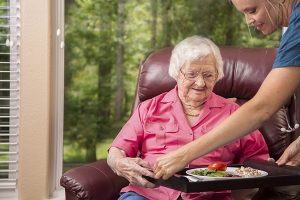
Finding care for elderly parents is necessary if you’re an adult child looking after aging parents.
As an adult child, you have your own life and responsibilities. You may be able to provide some of the care that your parents need, especially in the early stages of their aging process.
But what about when your parents’ care needs increase or their health declines?
Or, what if you live too far from your parents’ home to provide care yourself?
Getting professional help with aging parents can relieve your caretaker guilt and provide a better quality of life for your loved one.
So, how do you get help taking care of elderly parents?
In this article, we’re providing expert insight into taking care of parents at home. We’ll provide information on how to get help taking care of elderly parents and answer questions, like “Is there government assistance for caring for elderly parents?”
Read on to learn how to find a caregiver for parents that provides expert hands-on assistance to aging seniors.
Tips for Taking Care of Parents at Home
According to a survey by the FCA, 42% of family caregivers are adult children looking after aging parents.
However, many adult children may be unsure how to properly care for mom or dad and could use some support caring for elderly parents.
Here are some tips for adult children taking care of parents at home.
1. Assess Your Parents’ Needs
The first step to properly caring for aging parents is to assess their needs.
Are your parents mostly independent? In this case, your parents may simply benefit from someone who provides an extra hand around the house a couple of times each week.
Or, do your parents have trouble with personal hygiene and moving around the house? If this describes your parents, then they’ll probably need more intensive hands-on care.
Take time to consider what kind of assistance your parents might need. Understanding their situation will help you know what level of support would be best for them. It also provides you with a good idea of whether you can provide hands-on care for them or if you need to seek professional help taking care of elderly parents.
2. Make Their Home Safe
Another beneficial action to take is to ensure your parents’ place of residence is safe.
Some safety precautions to keep in mind include:
- Keeping the house clean and the floor clear of clutter
- Installing or tightening railings on stairways
- Placing non-slip strips in the bathroom/shower
- Making sure rooms are well lit
- Putting heavily used items within easy reach
- Displaying emergency numbers visibly
- Investing in an elderly monitoring device
The biggest safety issue that many seniors face is mobility. Minimizing fall risk is one of the most important things you can do to keep mom and dad safe.
3. Get Legal and Financial Matters in Order
It’s also a good idea to get your parents’ legal matters in order and take stock of their financial situation.
Legal Matters
As your parents age and you take over caregiver duties, you’ll want to make sure that you have access to important documents.
Documents that may be necessary to have on hand include:
- Birth certificates
- Social security cards
- House deed(s)
- Wills
- Cemetary plot certificates
It can also be helpful to look into becoming your parents’ power of attorney. Power of attorney allows you to make decisions on your parents’ behalf if they’re ever unable to make decisions themselves.
In addition, talking to a professional elder law attorney is an excellent way to ensure your parents’ legal matters are in order.
Finances
It’s also valuable to consider your parents (and your own) financial situation, especially if they may need extensive long-term care at some point.
Some financial areas to consider include:
- Social security income
- Pensions or IRAs/stocks/investments
- Medicare or other helpful benefits
- Outstanding debts or payments (e.g., medical expenses, car payments, etc.)
Your parents’ financial situation will likely affect whether or not someone will need to help pay for any of their expenses as they age.
However, if you’re already thinking of caring for your parents yourself, you may be happy to hear that the answer to “Is there government assistance for caring for elderly parents?” is “yes.”
For adult children looking after their parents, there are tax benefits and deductions you can take advantage of. In addition, the Administration on Aging (AOA) is a government agency that carries out the Older American Act and provides resources, programs, and help for elderly seniors around the country.
4. Care for Yourself
When it comes to caring for aging parents, it’s easy to become burned out. And when you’re exhausted or impatient, it will be more difficult to provide quality care to your loved one.
One of the best ways to ensure your parents get the care they need is to also care for yourself. Self-care means setting aside time to rest yourself physically, mentally, and emotionally.
Some ways you can promote self-care include:
- Setting aside a weekly date night for you and your spouse
- Regularly exercising or going to the gym
- Continuing to pursue hobbies
- Attending social events with friends/family
- Getting a respite caregiver to come a few hours each week
Ultimately, the more healthy and rested you are, the easier it will be to care for your aging loved one.
5. Finding Care for Elderly Parents
Lastly, if caring for your parents by yourself seems unsustainable, you can look into alternative care options or in-home support caring for elderly parents.
Residential Care
Some of the most popular alternative elder care options include:
- Assisted living facilities
- Nursing homes
- Continuing care facilities
Many of these options are convenient for adult children and also provide valuable, accessible services to aging adults. At the same time, they can often be quite expensive and may not give your parents the one-on-one care they truly need.
In addition, these options also require that you move your parents from a place they’re comfortable with into a new living environment. However, elderly adults often want to age in the comfort of their own home or a place that’s familiar to them.
One of the best ways to get help with aging parents and ensure that they can stay in a familiar place is through in-home care.
In-home Care
If you want professional support caring for elderly parents, in-home care is the solution for you.
In-home care managers and caregivers can provide help taking care of elderly parents to ensure they receive the care they need.
Care managers specialize in geriatric care management. They work with you to assess your loved one’s needs and create a personalized care plan tailored to their lifestyle. These care plans seek to provide whole-person care, taking into account your loved one’s physical, mental, and emotional health.
Caregivers are trained eldercare professionals who enter into your loved one’s home and put the care plan into action. Whether your loved one needs help with simple daily life tasks or is in need of more advanced dementia care, caregivers assist your loved one and help improve their quality of life.
In-home care also allows you to hire caregivers for as little as four hours a week or for as extensively as 24/7.
How to Get Help Taking Care of Elderly Parents
As an adult child, you may feel like it’s your duty to care for your parents as they age. However, taking care of parents at home can be challenging.
For those who are looking after elderly parents, five actions you’ll want to consider taking are:
- Assessing your loved one’s needs
- Making mom and dad’s residence safe
- Getting legal and financial matters in order
- Caring for yourself
- Finding professional care for elderly parents
One of the most beneficial resources for adult children taking care of elderly parents is in-home care. Home care managers and caregivers can provide needed support when caring for elderly parents.
If you’re interested in looking into in-home care but aren’t sure how to find a caregiver for parents, we’re here to help.
At Stowell Associates, we’ve been providing exceptional in-home care to aging seniors in the Milwaukee area for nearly four decades. Having spent so much time in the industry, we have vast experience and resources that allow us to meet any level of need. With highly trained Care Managers and Caregivers, we’re ready to provide the professional hands-on care your loved one needs.
Contact us today to talk with one of our Care Advisors about how in-home care can relieve your burden and improve your loved one’s quality of life.













